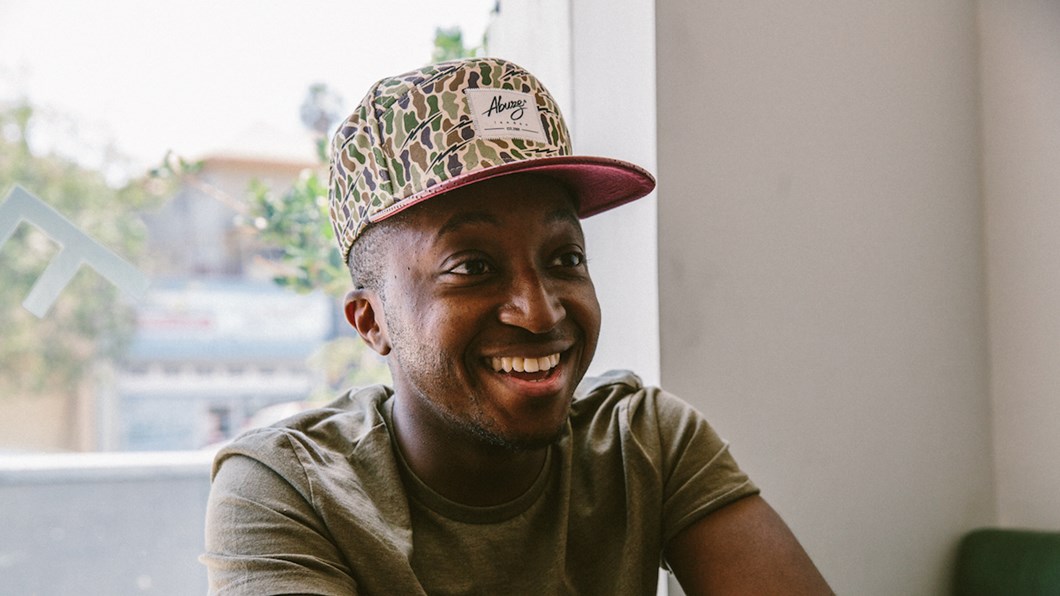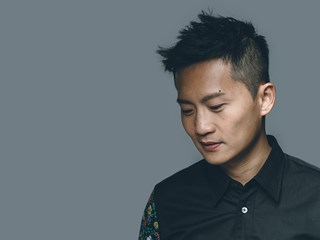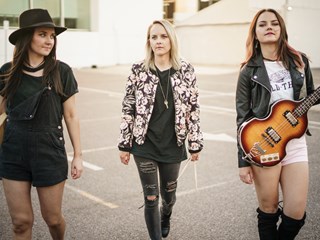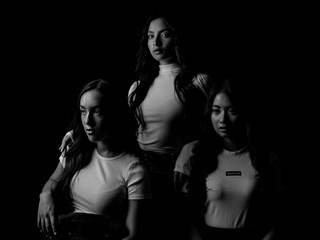Los Angeles' Ostrich Farm restaurant isn't large, but it takes a minute to locate Tinashé Fazakerley, or as he's known to his burgeoning fanbase, Rationale. The British singer/songwriter is leaning against a window, hiding in plain sight with an Abuze baseball cap pulled low across his head—which, perhaps, isn't surprising from an artist who isn't shy but hates to watch himself perform. When his tour manager pulls up a live video on his phone to show off the singer's new neon stage sign, the musician cringes and playfully throws his hands up in defeat.
Fazakerley's low-key charm extends over lunch, where he reveals a slate of personal facts: He's a big fan of photography; he wants to know the best neighborhoods in Los Angeles to grab a few shots. He needs something new to read, and, even though he's never heard of David Sedaris, the up-coming slate of Rationale tour dates makes him eager to check out the essayist's thoughts on living abroad.
Later that evening at the Bootleg Theater, the low-talker at lunch is almost unrecognizable. It may only be his sixteenth show as Rationale, but Fazakerley's stage presence is veteran—he's full of perfect high notes, slick dance moves, and expertly executed stage banter. ("I'm taller than you expected," he cracks to the crowd. "It's an actual thing. Standing tall at 5'9"!") Watching his live set, it's no wonder that Bastille chose him as the first signee to their label Best Laid Plans Records.
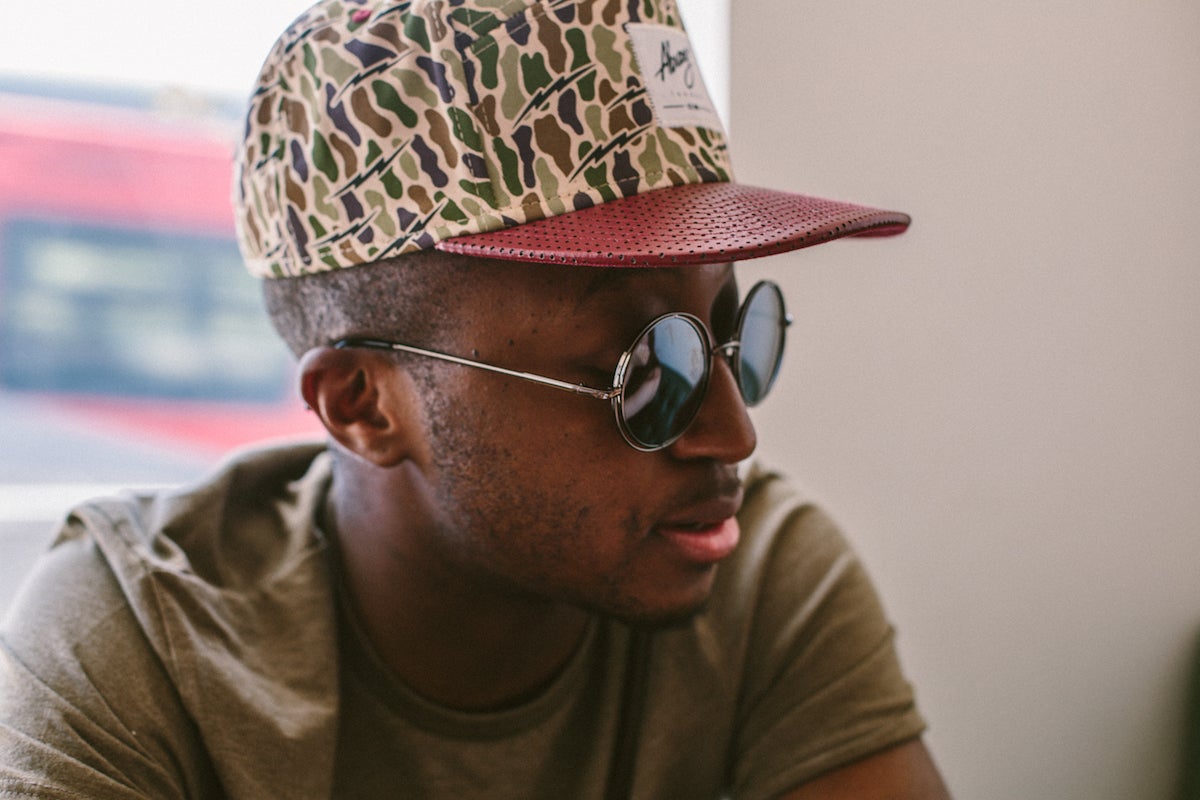
You grew up in London right?
I did. I first arrived in England when I was seven at a place called Clapton. It's a dilapidated area that's gentrified now. We moved over there because life in Zimbabwe wasn't the easiest at the time. My mom is a driven person. She worked a lot. I became the kind of kid who was in school, staying late and tinkered around with guitars and computers. I always loved the idea of creating things from scratch. It started early in primary school.
Did you find a likeminded group of kids?
In the beginning, not so much. I was the kid who had the accent. People were not so warming to that. When I hit secondary school, or middle school, I made a series of friends who enjoyed making music in the depths of a dark room while the other kids were playing sports.
When did music become your career?
I think it's always been that way. During my early 20s I wanted to be a musician but I did everything under the sun. Really embarrassing jobs. I once worked in a department store pretending to a robot, walking up escalators five days a week. In my mid-20s, I started to do some songwriting. Slowly I got some cuts that I liked. I did a set of albums for The Voice.
Wait, what?
I would write for the winner of The Voice in Switzerland. For me, that's paying your dues and learning how to work in the studio. I kind of enjoyed that experience. All the time, I was working on Rationale and putting these songs together. The funny thing is, when you work with lots of singers, you start to then learn how your voice works. If someone's a baritone, you have to sing and write in their key. I would work on stuff that was quite low down in my register.
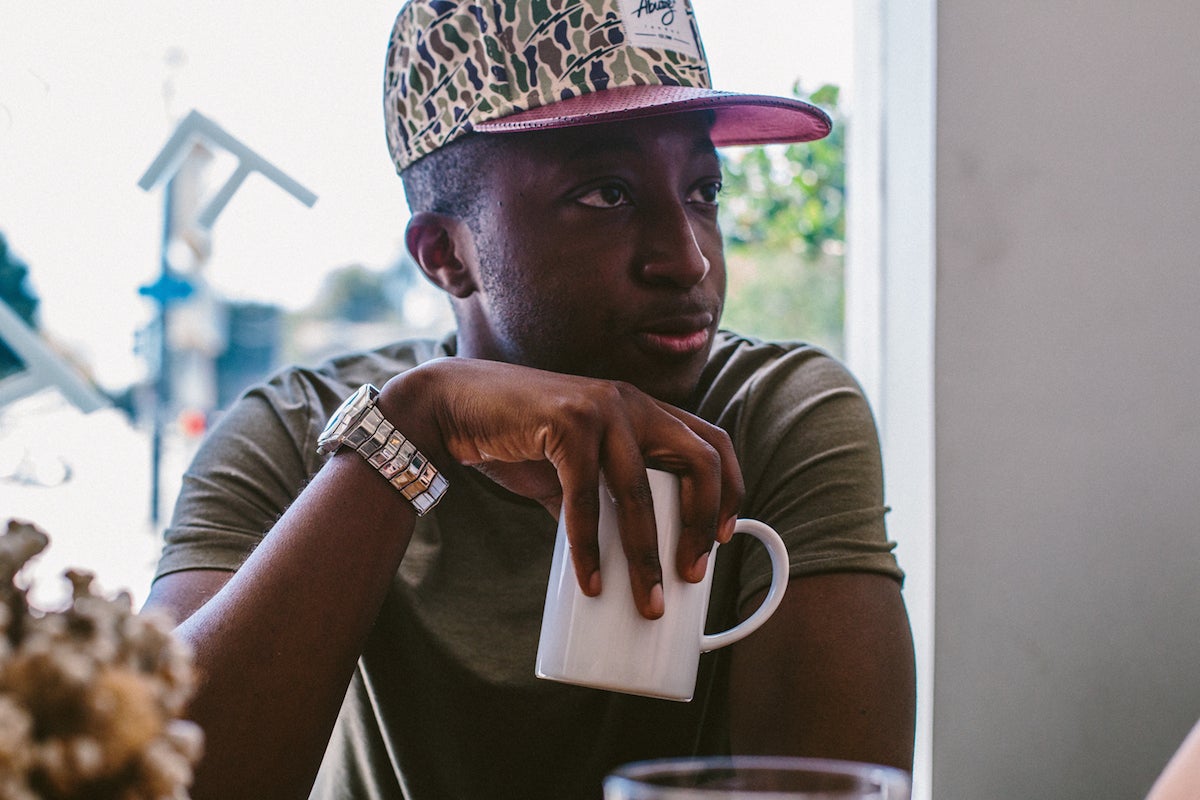
How did you pick the name Rationale?
One of the jobs I had was working at call center five years ago. I was down in the dumps and had to get money fast. I decided I'd give it a try for a day. So they gave me a sheet of paper that had a whole process of how to have a phone conversation. You start with the introduction, you give them a compliment. And then smack bang in the middle you talk about the charity you're calling for. Of course two seconds in they're like, "Get off my phone I have things to do!" But if you can get past those two seconds you get to a certain part of the speech called the rationale—which is where you explain why it's a great idea to give up their pounds. When I was looking for names, I looked up the definition of rationale. No matter what job I had, music was the basis and meaning behind my existence.
[The waitress comes to take our order. Fazakerley orders the salmon BLT.]
Do you think you could have handled success as a 20-year-old before having all these other jobs?
I don't think I could have, to be honest with you. I'm the kind of person who enjoys making music alone and being left alone. I don't want to be a celebrity at all. Yesterday, I was in a meeting with Katy Perry and she brought her boyfriend Orlando [Bloom] along. It was really surreal. I remember going home to my hotel and thinking, "Wow, it's a bit of a curse, this whole celebrity thing."
Someone I look up to is Ed Sheeran. He understands how to make music and be a person and not change. If you think of anyone who's really successful, they always seem to be the underdog. I like the idea of the underdog, you know? The person who doesn't look dashing and ready for the cover of Vogue magazine. Adele is the opposite of a pop star as you can imagine. But she writes great songs and has a great voice and that's what matters.
And now you have a full-length coming out in the fall. Have you managed to stay optimistic during the process?
Or drugged down by the perils of the record industry?
It sounds so poetic when you say it.
I'm good. [Gestures to his tour manager, who is engrossed in answer emails.] Complacency is a bit dangerous, isn't it? I don't want to get there. I'm precise person, but I'm ready for the work that comes with it.
The album will be out in September. By then, I will have done this tour, my first TV over here. Just coming from Jools Holland in the UK. That really satisfies me. I grew up watching that stuff as a kid. I remember being nine and watching Jools on television. Or Top of The Pops.
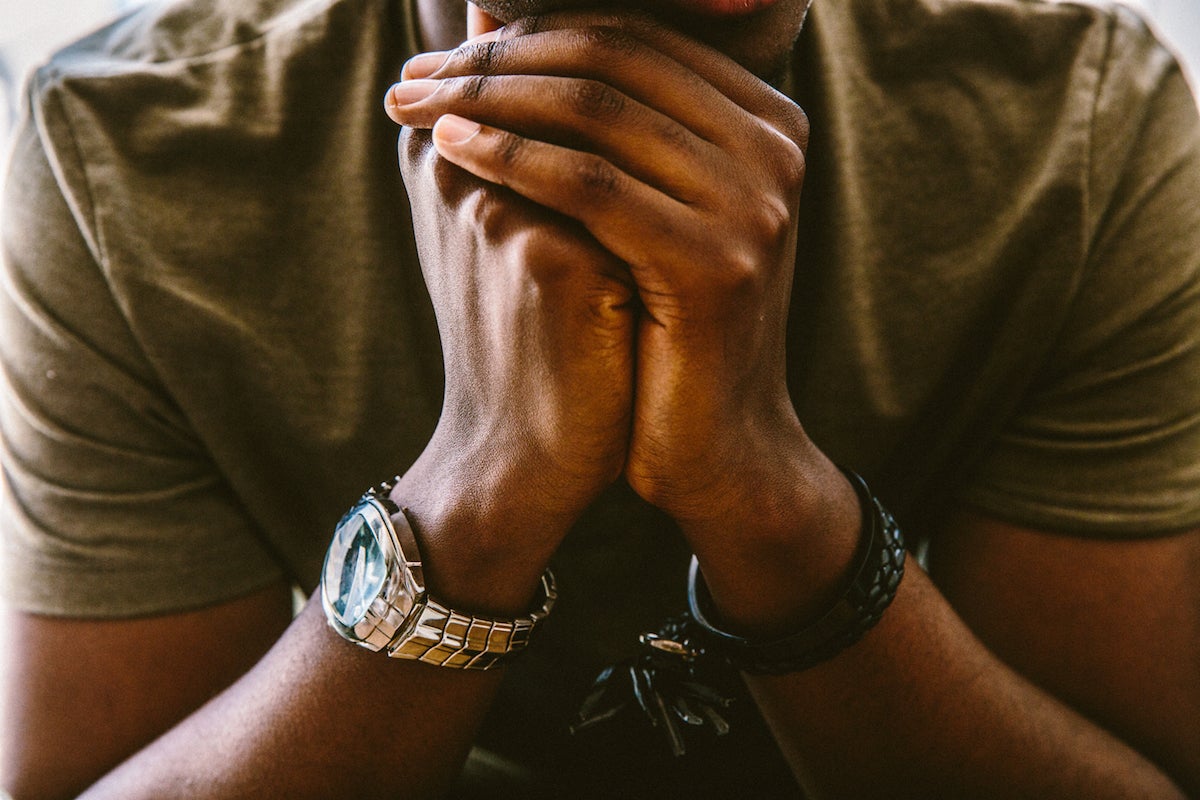
When you do something like Jools Holland, does your mother kinda go, "Oh success, I get it now."
She was there! I brought my brother along too. I think that was a big deal for them. She realized that perhaps this music game isn't a joke after all. When I was 15, I told her I wanted to do something musical and wanted to do a national diploma in popular music. She's hardcore African. So you telling your mom you're not going to be a doctor or a lawyer is sacrilege. She kicked me out of the house. It was a couple of months before I came back. I was sofa surfing for awhile. Up until about 25, she didn't take it seriously. The only time she realized that I was doing something maybe worth doing was when Pharrell Williams was saying something about us on the radio. "Oh I know him! Oh you're doing something good then!" But I like that silent love and championing. She's a strong figure. There aren't enough of them.
How has this project changed your musical sensibilities?
Have you ever worked on something for a long period of time and then mentally gone back and thought "who was that?" There's one particular song that I worked on in November about the dad that was never there. I wrote it and went back and listened to the lyrics and realized that this was my story. Initially I wanted it to be a story about a young man who has experienced abandonment and wants to not emulate the mistakes of his father.
What was your reaction when you realized your subconscious had gotten the better of you?
I think people lean toward music that feels like it's been written from the heart. When I go back and listen to my records, all of it to me feels generally about me. Unfortunately, some friends are not happy about that.
Is there a line you try not to cross? Can you keep yourself from co-opting someone else's narrative?
No, unfortunately. I think it's more important to try and write as brutally as possible and then go back and see if you need to cut stuff. Writing honestly provides positive results. That's the thing about music: There's only so many notes on the keyboard and so many chords you can play. The order you play them and the things you say are the puzzle pieces that fascinate me. I love people like Donny Hathaway or people like Morrissey for the way that they put music together. There's a specific feeling about that. They're all very raw songwriters and they remain timeless because of that. That's what I'm trying to achieve.
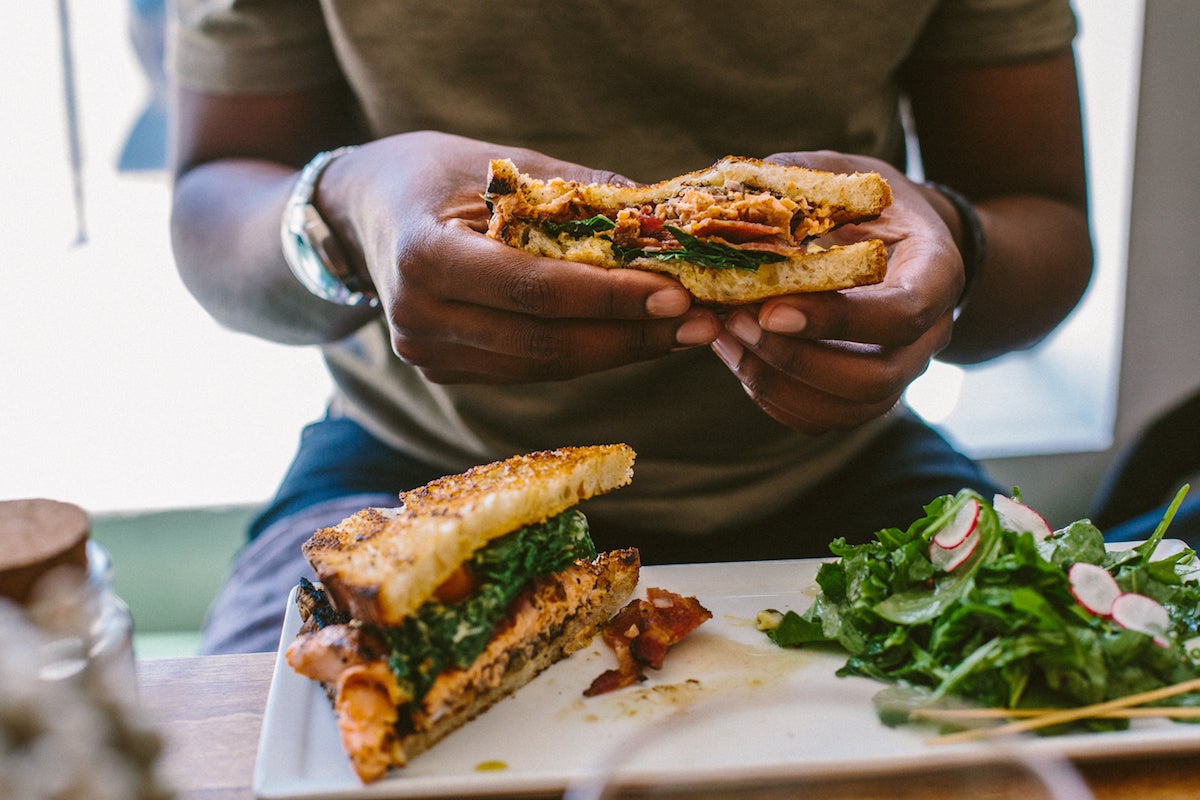
[Our food is delivered. Each dish is layered with an artist's eye. We pause for a moment—taking it in before continuing.]
I'm going to dig in here.
Did you find yourself writing about the same themes on the album as the EP?
Initially I thought it would go that way, that it would be a continuation of the EP. There's inspiration from people like Prince and Phil Collins. There are moments that will be quite surprising for some people. I haven't flexed quite as heavily the R&B muscle as I would like to. It's going to be an album full of variety. I'm excited to see what the take will be on the more challenging tracks. There's one in there that's similar to Kanye West "Black Skinhead."
Who in your life do you use as a guide to help determine if you're on the right path?
The people who instilled a work ethic in me are the people who are closest to me. There's a music teacher I knew once who juggled four jobs, teaching me and my class music five days a week, running a choir that was nationally celebrated, and, at the same time, being a dad and writing poetry. Musically, it would have to be Donny Hathaway and Jimmy Hendrix. I always go back to that stuff whenever I'm working my guitars and thinking there must be a way to make it sound better. I reference it and realize I'm not done yet.

